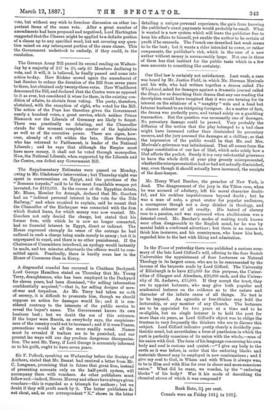Our libel law is certainly not satisfactory. Last week, a
ease was heard by Mr. Justice Field, in which Mr. Herman Merivale and his wife, who had written together a drama called The Whiphand, asked for damages against a dramatic journal called the Slags, for so describing their drama that any one reading the description would have imagined that it was one turning for ita interest on the relations of a " naughty " wife and a fond but fatuous husband to an intriguing foreigner. As a matter of fact, the drama was perfectly pure, and turned solely on a gambling transaction. Bat the question was necessarily one of damages. No pecuniary damage could be proved. Very probably the diffusion of the notion that the play belonged to a bad class might have increased rather than diminished its pecuniary success, and the jury assessed the damages at a shilling ; so that the impression of the public would be that Mr. and Mrs. Merivale's grievance was infinitesimal. That all comes from the vulgar constitution of our law of libel, which asks solely how a libel affects the pocket. Surely it is a very substantial grievance to have the whole drift of your play grossly misrepresented, whetherthe misrepresentation had or had not actually diminished, nay, even though it should actually have increased, the receipts of the door-keeper.


































 Previous page
Previous page